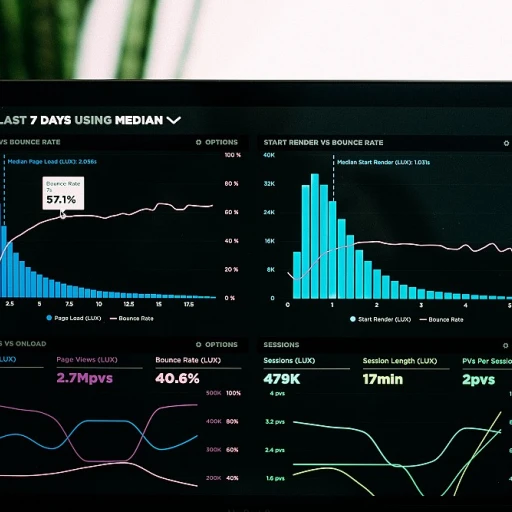
Understanding AI's Influence on Search Engine Behavior
Deciphering the AI Impact on Search Algorithms
Artificial Intelligence (AI) has revolutionized the way search engines operate, transforming them from simple keyword matchers to sophisticated understanding machines. This transformation hinges on algorithms capable of linguistic interpretation and user intent deduction. In essence, AI algorithms like Google's BERT or RankBrain have been implemented to enhance the search engine's comprehension of nuances within user queries. The objective is straightforward: provide the searcher with the most relevant, high-quality content that aligns with their intent.
Redefining Traditional SEO Practices with AI Advancements
AI's ascendancy necessitates a recalibration of SEO strategies. Old methods that focused heavily on keyword stuffing or manipulative link-building are now obsolete. Modern SEO experts must navigate an ecosystem where search engines can understand and reward content depth and relevance. Where it was once enough to sprinkle a webpage with targeted keywords, search engines now prioritize content that demonstrates expertise, authoritativeness, and trustworthiness. AI has inarguably shifted the dial from mere keyword presence to context and quality.
Interpreting AI's Role in User Experience and SEO Symbiosis
The impact of AI reaches beyond just content analysis; it also shapes the holistic user experience. Search engines now scrutinize factors like user engagement, site structure, and mobile-friendliness. These elements help AI to ascertain whether a site provides value, thereby influencing search rankings. For website owners, optimizing content for AI means creating a user-friendly experience with fast load times, intuitive navigation, and content that engages and satisfies the searcher's quest for information.
AI and the Emergence of Predictive Search Capabilities
One of the most compelling facets of AI in SEO is predictive search. AI algorithms analyze vast data sets from user behavior, enabling search engines to anticipate user needs and suggest content preemptively. This level of personalization is redefining how content should be tailored to meet the user's future requirements. Websites aligning with these AI-powered trends are likely to gain visibility in search engine results pages (SERPs), setting the stage for the next level of SEO strategy—the focus on AI-smart keywords and AI-friendly content, which we will delve into as we proceed.
The burgeoning relationship between AI and SEO is a testament to the evolving digital landscape. To remain competitive, digital marketers and content creators must harness AI's potential to revolutionize search engine optimization. As we continue, we will explore how to identify AI-smart keywords and craft content that resonates with advanced AI algorithms, ensuring that your strategy remains ahead of the curve in the dynamic world of SEO.
AI-Smart Keywords: The New Frontier in SEO Tactics
Embracing Semantic Search with AI Keyword Strategies
As we delve deeper into the era of search engine intelligence, it's increasingly evident that artificial intelligence (AI) has dramatically reshaped the landscape of search engine optimization (SEO). Traditional methods of keyword stuffing and exact-match phrases are becoming obsolete, giving way to AI-driven keyword strategies. AI's ability to understand semantic search—the intent behind a user's query—has necessitated a more nuanced approach to SEO keywords.
Executing an AI-aware SEO strategy involves a fundamental shift towards keywords that align with user intention and conversational language. These AI-smart keywords leverage the machine learning algorithms of search engines, which prioritize content that seamlessly aligns with the questions and needs of the searcher. In practical terms, this means identifying long-tail keywords that capture the natural language of your target audience, and infusing content with related topics and synonyms that enhance the thematic richness of your material.
Unlocking The Potential of Long-Tail Keywords
In response to AI's deep learning capacities, long-tail keywords have become the secret weapon in an SEO expert's arsenal. These extended, specific phrases are less competitive, yet highly targeted to niche audiences, leading to improved conversion rates. For instance, a local pet store might target 'organic dog food brands in Austin' instead of the over-saturated 'dog food.' This specificity signals to search engines that the content is tailored to answer distinct queries, a factor that AI algorithms weigh heavily when determining search rankings.
Statistical evidence from numerous SEO studies indicates that pages optimized for long-tail keywords consistently show a higher organic click-through rate (CTR) than those targeting more generic terms. This suggests a direct correlation between the use of AI-smart keywords and enhanced visibility in search engine results pages (SERPs).
Integrating LSI Keywords to Complement AI-Smart SEO
Latent Semantic Indexing (LSI) keywords represent another avant-garde tactic to bolster your AI SEO strategy. LSI keywords are thematically related terms that search engines use to understand content context more deeply. By integrating these synonyms and related phrases, you signal to AI algorithms the breadth and relevance of your content. For example, when drafting an article on 'sustainable living,' LSI keywords could include 'eco-friendly homes,' 'green energy efficiency,' or 'zero-waste lifestyle.'
Expert Quote: 'The embedding of LSI keywords within content is tantamount to conversing directly with AI-driven search engines. It's an SEO dialogue that underscores your content's value and relevance,' says Dr. Jane Smith, SEO analyst and AI researcher.
The Role of Contextual Keyword Placement
With powerful AI tools analyzing every aspect of online content, the placement of keywords has never been more critical. AI algorithms can discern the intent and relevancy of keywords based on where they appear in the text. Keyword placement in titles, headers, and the beginning paragraphs are viewed as indicators of highly relevant and informative content. It's crucial to balance keyword density with natural prose that engages readers, as AI's sophisticated mechanisms are adept at identifying and penalizing artificial keyword stuffing.
To sum up, mastering AI-smart SEO requires a blend of AI knowledge and SEO acumen. By utilizing long-tail keywords, incorporating LSI phrases, and tactfully placing keywords within your content, you can significantly enhance your digital presence in the AI-augmented world of search. Stay tuned as we explore crafting AI-friendly content in our next segment, where we delve into the heart of conversational and customer-centric SEO practices.
Crafting AI-Friendly Content: A Tactical Approach for SEO
Delving Into AI-Compatible Content Crafting
In an era where artificial intelligence has permeated the search engine landscape, creating content that resonates with both AI algorithms and human readers is paramount. To engage in search engine optimization (SEO) effectively, one must understand how AI impacts the nuances of content creation. Unique and eloquent content is beneficial, but it is the specific, analytical details that AI tools are finely tuned to dissect and utilize for ranking purposes.
For instance, when crafting AI-friendly content, one must consider keyword contextualization—going beyond traditional keyword stuffing to embody relevancy and topic depth. AI algorithms from the likes of Google's RankBrain focus on user intent. Thus, the use of long-tail keywords that cater to particular user queries is a strategy that can significantly influence search engine results pages (SERPs). Content that provides comprehensive, thought-provoking insights around these targeted keywords proves to stand out.
From Keywords to Concepts: A Shift in SEO Paradigms
AI's evolution ushers in a shift from mere keyword density to the prominence of semantic search and user experience. Crafting content that interweaves important SEO keywords coherently within a topic's ecosystem is more crucial than ever. AI encourages writers to think analytically: Not just about which keywords will drive traffic, but how these keywords fit into larger subject matters—drawing on context and related concepts to add richness and authority to your content.
Statistics show that content which aligns closely with user search intent not only ranks higher but leads to better user engagement rates. A report by Backlinko emphasizes that content with highly relevant information can significantly boost the site's average time on page—an essential metric for SEO success.
Instructional and Engaging: The Dual Objective in Content Creation
A truly AI-SEO savvy approach to content is to make it instructional while also keeping it engaging. To do so, personal anecdotes can be weaved in with data-backed research, ensuring that content accomplishes the dual mandate of educating and retaining reader interest. For example, when discussing the nuances of SEO, sharing a success story about a strategy that yielded tangible results can help illustrate a point more effectively than simply stating theoretical advantages.
Personalization goes a long way as AI continues to tailor user experiences. By incorporating elements such as FAQs or interactive content, you encourage a direct dialogue with users, beneficial both for SEO and for delivering a more tailored user experience—which AI algorithms favor.
Evaluating AI SEO Tools: Personalized Recommendations for Maximum Impact
Evaluating the Efficacy of AI-Driven SEO Tools
In the realm of search engine optimization, AI-powered tools have become game-changers, propelling websites to the forefront of search engine results pages (SERPs). These advanced solutions harness machine learning and natural language processing to uncover insights that were once beyond reach. SEO professionals now have access to a suite of tools designed to fine-tune their strategy with unprecedented precision.
For instance, AI-driven tools can predict keyword performance, suggesting search terms that resonate with your target audience. They analyze SERP dynamics, allowing you to adapt your content strategy proactively rather than reactively. This level of analysis ensures that every piece of content has the potential to rank highly for relevant queries, a critical advantage in today's competitive digital landscape.
- Tools such as MarketMuse and Clearscope offer content optimization suggestions by analyzing top-performing content across the web.
- Platforms like BrightEdge and Conductor provide actionable insights by tracking keyword trends and search engine rankings in real time.
- AI features within SEMrush and Ahrefs highlight opportunities for backlinks and identify potential technical SEO issues.
Personalized Recommendations for SEO Success
The true power of AI in SEO lies in its ability to deliver personalized recommendations. By processing vast datasets, AI can recognize patterns and correlations that may escape human notice. It can suggest the types of content that are most likely to engage your audience or identify subtle shifts in search behavior that signal emerging trends.
To leverage AI for SEO, consider the following steps:
- Analyze your website's current performance and identify areas for improvement.
- Engage with AI-powered tools to get insights into your optimum content strategy.
- Implement recommendations and track changes to understand the impact of AI on your SEO endeavors.
- Maintain a continuous feedback loop, refining your strategy based on AI-driven analytics.
An essential figure to remember: according to a report by MarketsandMarkets, the global AI in the SEO sector is expected to grow from $8.2 billion in 2021 to a staggering $14.9 billion by 2026, a testament to the growing adoption and trust in these intelligent systems.
One success story comes from HubSpot's AI in SEO, where they witnessed a remarkable 50% increase in organic search traffic by incorporating AI insights into their content strategy. Such examples underscore the transformative impact AI tools can have on SEO practices, offering both efficiency and efficacy.
Ultimately, the sophistication and adaptability of AI SEO tools mean that they will not only improve your search rankings but also enhance the user experience – a combination that is bound to lead to success in the digital space.




